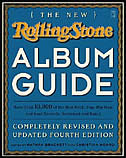| Working Drafts and Notes For: [The New] Rolling Stone Album Guide |
 |
Pink Floyd
Old Version
| The Piper at the Gates of Dawn (Capitol, 1967) | |
| A Saucerful of Secrets (Capitol, 1968) | |
| Ummagumma (Capitol, 1969) | |
| More (Capitol, 1969) | |
| Atom Heart Mother (Capitol, 1970) | |
| Meddle (Capitol, 1971) | |
| Relics (Capitol, 1971) | |
| Obscured by Clouds (Capitol, 1972) | |
| Dark Side of the Moon (Capitol, 1973) | |
| Wish You Were Here (Columbia, 1975) | |
| Animals (Columbia, 1977) | |
| The Wall (Columbia, 1979) | |
| A Collection of Great Dance Songs (Columbia, 1981) | |
| Works (Capitol, 1983) | |
| The Final Cut (Columbia, 1983) | |
| A Momentary Lapse of Reason (Columbia, 1987) | |
| Delicate Sound of Thunder (Columbia, 1988) |
Pink Floyd emerged in 1965, comprising Great Britain's answer to the San Franciscan psychedelic revolution. This quartet could fill a ballroom with swirling atmospheric feedback, no question, though lead guitarist and singer Syd Barrett's lysergic explorations stem from folk and pop roots rather than the blues. Instead of jamming like its American peers, Pink Floyd seems to lose it on The Piper at the Gates of Dawn's adventuresome tracks. "Astronomy Domine" and "Interstellar Overdrive" slip off into free-floating noiseplay, dramatically cohering again at just the right moment. Barrett exhibits a knack for writing pretty little ditties that can turn into unhinged sonic ruminations when you least expect it. Piper's slightly addled air of inspiration is genuine; the singularly talented Barrett became rock's most notorious chemical casualty not long after its release. Recruiting guitarist David Gilmour, the remainder of the band (bassist Roger Waters, keyboardist Rick Wright, drummer Nick Mason) carried on after Barrett's departure.
A Saucerful of Secrets continues the freakouts, though Waters's emergent songwriting voice surfaces on the eerie "Set the Controls for the Heart of the Sun." Gradually, David Gilmour asserts a fresh musical personality into Floyd's mix: his probing solos and coherent tone are a far cry indeed from Barrett's hyperkinetic, unpredictable outbursts. On the rambling double-album Ummagumma, Pink Floyd assembles the raw material from which Dark Side of the Moon will later emerge. Sound-effect collages here, brooding elongated versions of early material there: it took Pink Floyd awhile to reduce these elements into a readily accessible blend. Atom Heart Mother is an orchestrated, conventional art-rock mess -- Pink Floyd's only trip down this dead end road. The two soundtrack albums (More and Obscured by Clouds) are failed attempts to soften the Floyd attack with folk-rock influences.
Meddle is far more hard-edged and (slightly) more song-oriented than Ummagumma. It revolves around "Echoes," a slow-building, side-long psychedelic set piece. Even without a lightshow, this epic still wields considerable transportative powers. The concert movie Pink Floyd at Pompeii was shot around this time; that version of "Echoes" captures Floyd at its trippiest. Relics is a surprisingly packed odds 'n' sods collection that includes two Barrett-era gems: the Britsh hit single "See Emily Play" and the proto-glitter ode "Arnold Layne."
Dark Side of the Moon is Pink Floyd's commercial-meets-conceptual equinox. All the extra-musical weirdness gets reduced into a strong, orderly set of songs. Cunning little details like the cash-register ring on "Money" or the alarm-clock buzz on "Time" actually enhance their surroundings. That's indicative of Floyd's newfound focus and discipline; so are the catchy chorus and Waters's pointed lyrics. Even the spare, distinctive packaging reflects the clarity and precision of the music. A certain distance -- and chill -- results, too. There's a faint above-it-all air to the sound of this masterpiece, and to the substance of Waters's pronouncements about humanity. Arguably, Wish You Were Here is warmer and more approachable than Dark Side. The previous record's dynamic contrasts are smoothed out in a suite ("Shine on You Crazy Diamond") interrupted by related songs. The band confidently moves through space-rock and lite jazz-fusion sections, the haunting central theme never far out of consciousness. "Welcome to the Machine" introduces Waters's fascination with pessimistic sci-fi views of the future. There lies Pink Floyd's future, too.
The Orwell-inspired allegory of Animals isn't nearly as involving, though the music sighs and surges exactly according to plan. David Gilmour's relaxed guitar lines -- lyrical and stinging -- come to dominate the Floyd horizon at this point. Ironically, The Wall is where Roger Waters virtually assumes control of the group. This double-album narrative spawned Pink Floyd's biggest hit ("Another Brick in the Wall"); many people hear it as the fufillment of previous ambitions. If you're not inclined to listen with the indeciperable liner notes in hands, however, you may wish this convoluted story included a couple more guitar-baited hooks like "Comfortably Numb."
The Final Cut articulates Waters's anti-war theme well enough, but at this point Floyd's studious high-tech approach begins to sound antiseptic and hidebound. After an acrimonious parting of the ways, the remaining trio valiantly carried on with A Momentary Lapse of Reason and the live Delicate Sound of Thunder. They shouldn't have bothered. Even though Waters's presence had become overbearing, his absence reduces Pink Floyd to an FM rock oldies act (at best) or a lumbering self-parody (at worst). The group remains a cash cow, of course. The conceptual tilt of Pink Floyd's best work makes compilation a tough job; Capitol's Works is woefully spotty, but Columbia's A Collection of Great Dance Songs (with "Money" and "Another Brick) makes for one great driving album. -- M.C.